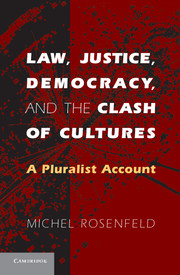Book contents
- Frontmatter
- Contents
- Introduction
- Part I Liberal Justice and Fleeting Specters of Unity
- Part II E Pluribus Unum?
- 4 Spinoza’s Dialectic and the Paradoxes of Tolerance
- 5 The Clash Between Deprivatized Religion and Relativized Secularism
- 6 Dworkin and the One Law Principle
- Part III Can Pluralism Thrive in Times of Stress?
- Bibliography
- Index
6 - Dworkin and the One Law Principle
Can Unity Be Imposed Through an Interpretive Turn?
from Part II - E Pluribus Unum?
Published online by Cambridge University Press: 05 June 2012
- Frontmatter
- Contents
- Introduction
- Part I Liberal Justice and Fleeting Specters of Unity
- Part II E Pluribus Unum?
- 4 Spinoza’s Dialectic and the Paradoxes of Tolerance
- 5 The Clash Between Deprivatized Religion and Relativized Secularism
- 6 Dworkin and the One Law Principle
- Part III Can Pluralism Thrive in Times of Stress?
- Bibliography
- Index
Summary
As presented in Chapter 4, Spinoza’s conception of tolerance handles the connection between the one and the many by departing from the one and finding traces of it in the many. The one for Spinoza is established through the convergences of reason, truth, and morals, and its imprints can be found most distinctly in true religion, but even to some extent in religion that veers toward superstition. In other words, true religion provides an alternative expression of the unity fashioned by the synthesis of reason, truth, and morals, whereas other religions may be regarded as attempts to approach the unity in question no matter how wide of the mark they may actually end up being. On the other hand, the pluralist constitutional approach to the relation between the state and religion elaborated in Chapter 5 starts from the many and discovers threads of unity that furnish means of fostering peaceful coexistence among the many within the confines of a single polity. Indeed, religions and non-religious ideologies are diverse and divergent, but they are, for relevant constitutional purposes, all on the same plane and all similar in positing paths toward self-fulfillment and self-realization.
In contrast, as will be discussed in this chapter, Ronald Dworkin’s famous thesis encapsulated in his steadfast assertion that there is one right answer to hard cases that defy simple logical or clear interpretive resolution starts at once from the one and the many and seeks to forge solid links between them through the deployment of legal hermeneutics. For Dworkin, unity derives from the universal validity of the equal concern and equal respect principle that will be further detailed later in this chapter. As against this, plurality emerges from the multiple competing resolutions that typically emerge in the context of hard cases. For example, to the question of whether there is a constitutional right to an abortion in the United States, many have answered in the affirmative and many others in the negative, and moreover reasons have differed among proponents as well as among opponents of abortion rights.
- Type
- Chapter
- Information
- Law, Justice, Democracy, and the Clash of CulturesA Pluralist Account, pp. 182 - 208Publisher: Cambridge University PressPrint publication year: 2011



